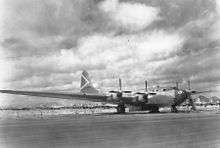Douglas XB-19
| XB-19 | |
|---|---|
.jpg) | |
| Role | Heavy bomber |
| National origin | United States |
| Manufacturer | Douglas Aircraft Company |
| First flight | 27 June 1941 |
| Retired | 17 August 1946 |
| Status | Scrapped |
| Primary user | United States Army Air Corps |
| Number built | 1 |
The Douglas XB-19 was the largest bomber aircraft built for the United States Army Air Forces until 1946. It was originally given the designation XBLR-2 (XBLR denoting "Experimental Bomber Long Range").
Design and development
The XB-19 project was intended to test flight characteristics and design techniques for giant bombers. Despite advances in technology that made the XB-19 obsolete before it was completed, the Army Air Corps felt that the prototype would be useful for testing despite Douglas Aircraft wanting to cancel the expensive project. Its construction took so long that competition for the contracts to make the XB-35 and XB-36 occurred two months before its first flight.
The plane flew on 27 June 1941, more than three years after the construction contract was awarded. In 1943 the Wright R-3350 engines were replaced with Allison V-3420-11 V engines. After completion of testing the XB-19 was earmarked for conversion into a cargo aircraft, but modifications were not completed, and the aircraft flew for the last time on August 17, 1946. It was eventually scrapped at Tucson in June 1949.[1][2]
Surviving artifacts

The new U.S. Air Force had plans to save the B-19 for eventual display, but in 1949 the Air Force did not have a program to save historic aircraft and the Air Force Museum had not yet been built. The B-19 was therefore scrapped, but two of its enormous main tires were saved. One was put on display at the Hill Aerospace Museum at Hill Air Force Base in Ogden, Utah and the other has been on display at the National Museum of the United States Air Force in Dayton, Ohio, in the "Early Years" gallery for many years.[3]
Specifications (XB-19A)
General characteristics
- Crew: 18
- Length: 132 ft 2 in (40.2 m)
- Wingspan: 212 ft 0 in (64.6 m)
- Height: 42 ft 9 in (13.0 m)
- Wing area: 4,492 ft2 (417 m2)
- Empty weight: 86000 lb (39000 kg)
- Loaded weight: 158,930 lb (72,000 kg)
- Max. takeoff weight: 164,000 lb (74,400 kg)
- Powerplant: 4 × Allison V-3420-11 V24 engines, 2,600 hp (1,940 kW) each
Performance
- Maximum speed: 265 mph (230 kn, 426 km/h)
- Cruise speed: 165 mph (143 kn, 266 km/h)
- Range: 4,200 mi (3,600 nmi, 6,800 km)
- Ferry range: 7,750 mi (6,730 nmi, 12,500 km)
- Service ceiling: 39,000 ft (12,000 m)
- Rate of climb: 650 ft/min (3.3 m/s)
- Wing loading: 35 lb/ft2 (170 kg/m2)
- Power/mass: 0.065 hp/lb (110 W/kg)
Armament
- Guns:
- 5 × 0.50 in (12.7 mm) M2 Browning machine guns
- 6 × 0.30 in (7.62 mm) M1919 Browning machine guns
- 2 × 37 mm (1.42 in) autocannon
- Bombs: 18,700 lb (8,480 kg) internal; maximum bomb load of 37,100 lb including external racks
See also
Aircraft of comparable role, configuration and era
Related lists
References
External links
| Wikimedia Commons has media related to Douglas XB-19. |
- Encyclopedia of American aircraft
- Popular Science, October 1940, Uncle Sam Builds Europe and Back Warplane
- "The World's Biggest Bomber" Popular Mechanics, December 1940
- "Man-O'-War With Wings" Popular Mechanics, July 1941
- "Monster Warbird B-19 Tries Out Its Wings" Popular Mechanics, September 1941
- "The Douglas B-19", Flight, 1941